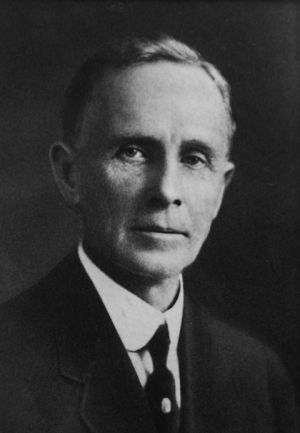Robert Munger
Robert Sylvester Munger (born July 24, 1854 in Rutersville, Texas; died April 20, 1923 in Birmingham) was an inventor and manufacturer who became president of the Continental Gin Co.
Munger was the son of Henry Martin and Jane Catherine McNutt Munger. He attended Trinity College in Tecuacana, studying bookkeeping and commercial law, but did not graduate. Instead he took charge of the cotton mill in Mexia, Texas when his father was incapacitated. He turned his attention to improving the mechanical operation of the mill and developed numerous improvements to cotton gins, specifically with regard to their efficiency and safe operation. He also designed pneumatic conveyors for seed cotton and saw cleaners and sharpeners.
Munger married the former Mary Collett in 1878. The couple had eight children: Collett, Robley, Eugene, Ethel, Leonidas, Rosa, Ruby, Mary, and Margaret.
Munger credited his wife's support for keeping him focussed on his mechanical inventions. His patented improvements, called the "Munger System", were exhibited at the 1884 World Cotton Centennial in New Orleans, Louisiana. Unable to interest established manufacturers in adopting his patents, Munger opened the Munger Improved Cotton Machine & Manufacturing Co. in Dallas in 1885. The effectiveness of his improvements were proved by every mill that adopted them and he was soon flooded with orders.
With backing from additional investors, Munger expanded the company to Birmingham in 1889 and reincorporated as the Northington-Munger-Pratt Company in 1892. He continued to develop improvements to his equipment. In 1899 Munger emerged at the head of a large-scale merger with six other gin manufacturers and named the new company "Contentintal Gin", with $4.5 million in capital stock. He won another 10 medals for his inventions at the 1893 World’s Columbian Exposition in Chicago, Illinois.
In 1902 Munger sold his interest in the Continental Gin and turned to real estate development. His major project was the Munger Place subdivision in Dallas. He also purchased William Mudd's former estate, "The Grove", at auction. He relocated his family from the former Mirabeau Swanson residence at Five Points South and named his new mansion "Arlington" in honor of Robert E. Lee's Virginia estate. He updated the house with steam heting, electricity and indoor plumbing. He also built homes for his children on the property as they married. Munger and his family attended First Methodist Church of Birmingham, and his support was instrumental in the establishment of Highlands Methodist Church and Walker Memorial Methodist Church.
Munger was an avid bicyclist and became an early promoter of the automobile, showcasing 1902 and 1903 Wintons. He purchased a 1905 Panhard et Levassor 50HP automobile in London, England, and later rode in Packards.
Munger was involved as a trustee of Birmingham College and helped guide its union with Southern University to form Birmingham-Southern College. As president of the board he presented U.S. President Warren Harding with the "key to the college" during his 1921 visit to Birmingham. In January 1922 the Birmingham News presented Munger with its second "Loving Cup" recognizing his philanthropic work. Birmingham-Southern's Munger Field was his gift to the college.
Munger was also a benefactor to the Birmingham YMCA and the Dallas YMCA, and to Southern Methodist University in Dallas and Birmingham's Howard College. He contributed heavily to the Belgian Relief Fund after World War I and was well-known for his generosity, even when it was necessary for him to borrow money to keep his charities funded and when there was no promise of reward. The News estimated that he had made more than half a million dollars in known gifts to local charities over 20 years and reported that, "there is hardly a worthy institution in the city that has not been the beneficiary of Mr. Munger's donations." Those donations included numerous gifts to Black churches, as well as to Central Alabama College, Miles College and other Black schools. He was also known to distribute private support to young people seeking education, such as Edna Gockel Gussen, whose music studies in Berlin he sponsored.
Munger died from pneumonia in 1923. His funeral was held at Arlington and he was buried in a large granite sarcophagus at Elmwood Cemetery. He left the main house at Arlington to his daughter Ruby and her husband, Alex Montgomery. He also left a large bequest to the Brother Bryan Mission. His widow continued his support for Birmingham-Southern, and the main administrative building, Munger Memorial Hall, was named for him when it was completed in 1928. He is also the namesake of the Munger Building, constructed by his heirs at Five Points South the same year.
Munger was inducted into the Alabama Men's Hall of Fame in 2018.
References
- "Munger's Manufactory" (May 28, 1885) Dallas Weekly Herald
- Dubose, Joel Campbell (1904) Notable men of Alabama: Personal and Genealogical 2 Volumes. Atlanta, Georgia: Southern Historical Association
- "Philanthropist Dies of Pneumonia Following Illness Of Only Few Days" (April 20, 1923) The Birmingham News
- Satterfield, Carolyn Green (2010) Arlington, Birmingham's Historic House. Arlington Historical Association
External links
- Robert Munger at Findagrave.com
- Robert Munger at the Alabama Men's Hall of Fame]
